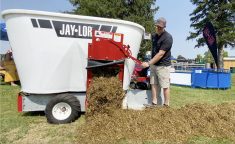Reuters –– Sheep herders in the U.S. West have banded together to sue their employers, accusing them of operating an illegal cartel that artificially suppresses their wages, according to court documents filed Wednesday in Nevada.
The case could have implications for how antitrust laws are applied to labour markets, according to legal experts, as the Biden administration pushes for greater competition in every sector of the economy.
The suit alleges that ranches co-ordinate through the Western Range Association (WRA), a ranching trade group, to suppress sheepherder wages and avoid competing for labour.
Read Also

Public opinion wanted on draft equine code of practice
Public consultations on a draft Code of Practice for the Care and Handling of Equines opened on Jan. 12.
Herders apply to jobs through the WRA which then assigns them to ranches, leaving no room for the herders to negotiate or shop around among ranches, the complaint said.
The arrangement violates the Sherman Act, a 130-year-old antitrust law that prohibits wage-fixing agreements among employers, the suit alleged.
“Even workers who make some of the lowest wages in our economy should be able to benefit from the fair competition that our antitrust laws ensure,” said David Seligman, executive director of Towards Justice, which brought the suit.
Ellen Jean Winograd, WRA’s general counsel, said the suit’s allegations “appear to lack merit,” but that the group could not comment in more detail.
Sheepherders are typically men from rural Peru who come to the United States on agricultural H-2A visas and live in isolated areas, according to the complaint. Their wages have stagnated even as pay for other agricultural labour has risen in recent years, the complaint said.
An earlier version of the suit was dismissed by the U.S. Court of Appeals for the Tenth Circuit in 2017 because the court said the herders had not sufficiently proven collusion. Several antitrust experts have argued the case was wrongly decided.
There are around 100,000 sheep farms in the United States that sell about US$750 million of sheep, lambs, and wool annually, according to Department of Agriculture data.
— Leah Douglas reports on the U.S. ag and energy sectors for Reuters from Washington, D.C.















